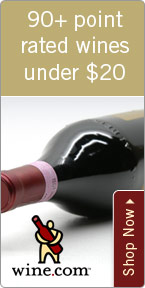Putting Wine Pairings To The Test

Wednesday - May 21, 2008
| Share
 Del.icio.us
Del.icio.us
|
You know how all those sommeliers (me included) have been telling you about certain food and wine pairings that don’t really work well? In the span of a week, I put many of those so called “bad” pairings to the test. And you know what? They weren’t all that bad ... well, except one.
Many of my friends and acquaintances travel frequently to China and often speak of dinners where all they drink famed Chateaux from Bordeaux. My reaction to which included a little apprehension at the thought of a Cabernet Sauvignon-dominated wine with seafood preparations and oyster sauce. I always think of drier-style Riesling for such a meal. So I decided do my own tests with a top-notch Bordeaux and Chinese food. I used a bottle of 2003 Chateau Mouton Rothschild with a myriad of dishes. The wine itself is still young, but evolving more quickly than other, more “classic” vintages. It has a super nose of sweet cassis, vanilla, coffee grounds, earth, tea and plums. It is rich on the palate but well-balanced. The first dish I tried it with was beef and ung choi with ham ha sauce. It was salty and rich in protein. I thought the bitterness of the ung choi would be exacerbated by wine, but it held together better than I thought. It wasn’t a great pair, but they did not conflict either. Next I had some cake noodles with minute chicken and choi sum. I know this is more an Anglo-Chinese recipe than traditionally Chinese, but it’s a local favorite. Again it was salty and a little oilier. Surprisingly there was enough acidity in the wine to cut through, and the toastiness of the oak in the wine actually found common ground with the smokiness of the seared minute chicken - not great, but not bad either. Something I had already predicted to go well was the barbecue Szechuan-style pork ribs, and it did. The salty sweetness and grilled essences were a great foil for the sweet fruit and toast of the wine. It was definitely the best pair of the dinner.

|
Another weird pair that I tried against all odds was a German Riesling with roasted beef and mushroom gravy. I opened a bottle of 2006 Josef Leitz Dragonstone Riesling with its vibrant and sweet-smelling apricot and apple aromas combined with a palate teeming with citrus orchard fruits and a delectable touch of sweetness. The beef is coated with rosemary and seasonings, and slow-cooked without much caramelizing of the meat. I pinned this dish perfectly with an aged Grenache, but how would Riesling handle it? It wasn’t too bad. The Riesling was still refreshing and cleansing. Acidity being the key component in this pair, it was able to cut through the fattiness of the beef as well as the gravy. The flavors were not a complete match; however, the aromatics of the rosemary and mushrooms went very well with the minerality and floral components of the Riesling. Texturally, the beef was definitely cumbersome, but it did not utterly destroy the Riesling. It wasn’t something I would make a huge effort in reconstructing, but the experience left me with a sense of enlightenment, seeing how well the light Riesling could do if it were the only wine left on earth.
The one pair that I really could not get over was a Napa Valley Cabernet Sauvignon with yellow Thai chicken curry. The wine will remain anonymous to preserve its innocence. It was more than fine alone, but when it hit the palate with the curry, the alcohol and oakiness were obtrusive and bitter. The only thing they shared was the space in my mouth and my belly. I actually had to stop drinking it. Let me save your palate from this feud. Grab a beer if you must, but just avoid these two together.
2007 Hugel “Gentil” ($15) This “kitchen sink” blend of Riesling, Pinot Blanc, Gewurztraminer, Pinot Gris and Muscat has a wildly complex aroma and is beautiful to drink. Thirst-quenching and vibrant - a terrific value!
Roberto Viernes is a master sommelier. E-mail .(JavaScript must be enabled to view this email address)
E-mail this story | Print this page | Comments (0) | Archive | RSS Comments (0) |
Most Recent Comment(s):












